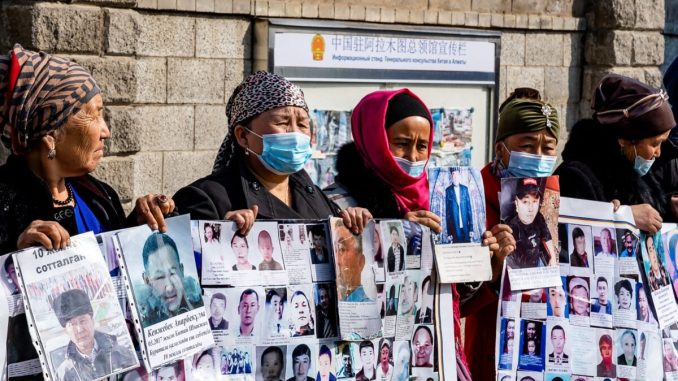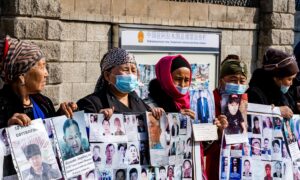

WASHINGTON—China’s religious freedom violations and its growing influence and activities beyond its borders were “the most troubling developments” of last year, according to an independent, bipartisan U.S. federal government commission.
In its 2021 annual report released on April 21, the U.S. Commission on International Religious Freedom (USCIRF) called out China as one of the world’s “egregious violators” of religious freedom. The report stated that religious freedom conditions in China deteriorated further in 2020.
This year’s report highlights not only Beijing’s abuses targeting its own people but also its growing international influence on religious freedom and human rights.
The commission found that Beijing’s economic and geopolitical influence overseas had negatively affected religious freedom and human rights in other countries.
“Tactics include harassment, intimidation, and detainment of human rights activists, ethnic and religious minorities, and other critics and dissidents,” the report said.
Countries including Turkey have yielded to Beijing’s pressure, silenced critics, and even repatriated Uyghur refugees to China, the report added.
Religious freedom violations by the Chinese Communist Party (CCP) and its growing threats and intimidation overseas “represented the most troubling developments that we saw in 2020,” Tony Perkins, USCIRF’s vice chair said at a virtual press conference on April 21.
The Chinese regime is also forcing international companies, including U.S. firms, to disregard human rights abuses in China, according to the report, threatening company executives to “choose between complying with U.S. laws and Chinese laws.”
It is “reprehensible” to see American companies benefiting from products or services that are coming from forced labor in China’s northwestern region of Xinjiang, Perkins told The Epoch Times.
He criticized the companies and the U.S Chamber of Commerce for opposing the bipartisan Uyghur Forced Labor Prevention Act.
“These things should not even be in question,” Perkins said. “They need to get their act together.”
Beijing has repeatedly denied allegations of forced labor abuses and recently encouraged a nationwide boycott over Western apparel and footwear brands that have distanced themselves from sourcing materials from Xinjiang.
“Alarmingly, China also has been exporting both its internet governance model and advanced surveillance technology and equipment to countries—such as Belarus, Venezuela, and Zimbabwe—where repressive governments actively persecute and oppress human rights activists and political opponents,” the USCIRF report stated.
Repressive regimes worldwide that seek to replicate a “China model” and import the regime’s “digital authoritarianism” use Chinese technology companies such as Huawei and ZTE to implement and deploy such technology, according to the commission’s report.
Speaking at the virtual press conference, USCIRF commissioner Nury Turkel said that countries in Central Asia such as Kazakhstan and Tajikistan increasingly “use Chinese methods for political repression and religious persecution.” A number of other countries, such as North Korea, Venezuela, and Iran are also using Chinese surveillance technology to repress religious and ethnic minorities, he said.
USCIRF’s vice chair Anurima Bhargave added that China’s influence is also playing out in places like Burma, Vietnam, and other neighboring countries.
A leading advocacy group, Human Rights Watch in January declared that China “remained the biggest threat to global human rights” in 2020.
Forced Organ Harvesting
The regime’s more than two-decade-long persecution of adherents of the spiritual discipline Falun Gong, also known as Falun Dafa, was also highlighted in this year’s report.
“According to reports, thousands of Falun Gong practitioners were harassed and arrested during 2020 for practicing their faith, and some likely died due to abuse and torture while in custody,” the commission stated. “Credible international reports also suggested that organ harvesting, including from Falun Gong practitioners, likely continued.”
Evidence of organ transplant crimes continues to emerge in China, with investigative reports indicating that the number of organs harvested continues to surge and that organs are available on-demand, with short waiting times.
According to Turkel, the CCP’s forced organ harvesting practice has “reportedly expanded to Uyghur prisoners.”
“They are even marketing Uyghur organs in the Muslim majority countries. They have a special hospital in Beijing. They promote that hospital through video messages, saying that the Muslim organs are available,” he said at the press conference.
Based on reports, he added, the wait times for organ transplant have shortened significantly to 48 hours.
Turkel also noted that Uyghurs not only in prisons but also in concentration camps are subject to organ harvesting.
In early March, a bipartisan group of U.S. lawmakers in the House and the Senate introduced the first legislation to combat China’s state-sanctioned practice of forced organ harvesting, called the Stop Forced Organ Harvesting Act.
Foreign Policy Priority
Last year, the Trump administration prioritized religious freedom in U.S. foreign policy. In June 2020, President Donald Trump signed an executive order on advancing international religious freedom and integrated the issue into the U.S. foreign policy and foreign assistance programs. And in February last year, the United States launched the first-ever International Religious Freedom Alliance. Currently 32 countries are member of the alliance.
In January this year, the Trump administration declared CCP’s abuses of Muslim minorities in Xinjiang “genocide.”
The Biden administration also declared China’s treatment of Uyghur Muslims genocide and sanctioned Chinese officials over human rights abuses in March. The new administration, however, has not made international religious liberty a foreign policy priority.
“We still really don’t know exactly where this administration will land when it comes to religious freedom in our foreign policy,” Perkins told The Epoch Times.
USCIRF was created by the 1998 International Religious Freedom Act to monitor religious freedom conditions in foreign countries throughout the year.
This year, the commission designated 14 countries including China as countries of particular concern as they are severe violators of religious freedom. The list includes Burma, Eritrea, India, Iran, Nigeria, North Korea, Pakistan, Russia, Saudi Arabia, Syria, Tajikistan, Turkmenistan, and Vietnam.
The commission’s report also highlighted the global reach of the Covid 19 pandemic, which has impacted international religious freedom.
While governments took sweeping action to protect their citizens from the spread of the virus, restrictions have deepened religious divides and intensified religious persecution and violence in some countries, according to the commission.





Be the first to comment